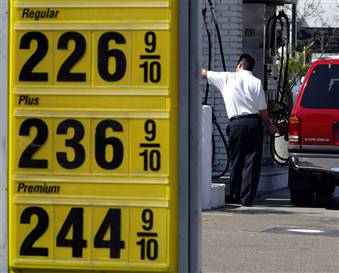
-
Syndicate this site (XML)
Powered by
Movable Type 2.64
Design by



March 07, 2006
Why Does Everyone Hate Wal-Mart?
![]() For many people these days, it seems, Wal-Mart is at the top of the "hate" list. Some of the grievances against the retail giant include:
For many people these days, it seems, Wal-Mart is at the top of the "hate" list. Some of the grievances against the retail giant include:
*Wal-Mart doesn't give healthcare to half its employees.
*Women claim they are discriminated against when it comes to pay and promotions.
*Wal-Mart buys too many products from China
*Wal-Mart puts small mom-and-pop organizations out of business.
*Wal-Mart doesn't pay its employees enough.
*Wal-Mart is building too many stores.
Oh, and the latest rumor is that Wal-Mart is paying bloggers to portray it positively (John Ruberry has more). I would like to state for the record that I have never been paid by Wal-Mart. In fact, they don't even know I exist!!
Back to Wal-Mart. Why is it the target of so much venom? According to its own Website:
*Wal-Mart employs 1.6 million associates worldwide in more than 3,600 stores in the United States and more than 1,500 international stores.
*76% of our store management started in hourly positions.
*Our average hourly wage for regular full-time associates in the U.S. is $9.68 an hour, almost double the federal minimum wage.
Of course, one wouldn't expect Wal-Mart to badmouth itself on its own Website. However, are they really as horrible as they are being portrayed?
Think about it: How many independent retailers offer more than minimum wage to start? How many offer insurance? How many offer plenty of room for advancement? For many years I worked for an independent pharmacy. I started out at minimum wage (back then it wasn't even $5/hour) and my raises were at my employer's discretion, not on any set schedule. Also, as he was sole proprieter, it wasn't likely that any of us who worked there would rise to great managerial heights there. I also had no insurance coverage.
That was a part-time job while I was in high school and college. I've "moved up" since then, something many Wal-Mart employees can do as well.
If working for Wal-Mart is such a raw deal, why is it that over 25,000 people applied for 300 available jobs at this outlet?
Wages? It's the usual thing: some people think that wages should be regulated. The unions would love to get in on the Wal-Mart racket, and they're the ones making the most noise. It's not so much that they want to help the poor, oppressed 1.6 million Wal-Mart workers, but they look upon it as a cash cow opportunity. Think of how much dues money 1.6 million people can generate! (I found this story about union picketers at Wal-Mart to be sadly funny in its hypocrisy.)
As for the other issues mentioned above, there are going to be complaints about women being discriminated against in the workforce for the forseeable future. There are plenty of retailers who buy from China, and not just Wal-Mart. Blame the government for granting China most-favored-nation trade status, if you must, but not Wal-Mart, as it is simply looking to please its customers by offering low prices. And like any healthy business, Wal-Mart will continue to expand. If a community doesn't want Wal-Mart then they can try to block it from moving in.
Why aren't people complaining about other chain stores, like Target or Kohls?
I think Wal-Mart has become a target for three main reasons: it won't let unions in, it doesn't cater to the elitist classes, and it is successful. Any institution that is a success is subject to envy.
Makes me think about the world view of the US in general.
For more on the Wal-Mart controversy from someone much more qualified than I am to discuss it, read this article by Thomas Sowell.
Show Comments »
November 11, 2005
Regarding Oil Profits
Recently, executives of oil companies defended their recent spate of high profits in the wake of high prices for consumers as a result of this year's hurricane season.
The executives blamed the Gulf Coast hurricanes, which shut down refineries, and global forces, including rising crude-oil prices. They argued that their business is cyclical, citing weak profits in the late 1990s.

ExxonMobil CEO Lee Raymond told a joint hearing of the Senate Energy and Commerce committees, "There are ups, and there are downs. Our job is to manage for the long term."
But some senators weren't buying it.
"Most consumers find (the prices) terribly unfair," said Sen. Byron Dorgan, D-N.D. "Talk is cheap."
What's wrong with this argument? Oil companies have a commodity that a lot of people want--oil for heating and energy. Sometimes that commodity is in short supply, and as is normal in a market economy, prices go up when supplies run low. It can happen with any commodity, including food.
So now we have senators accusing the oil companies of charging unfair prices while oil execs say they aren't being unfair, and that their profits aren't as big as we might think. We also have senators accusing the oil companies of not building more refineries, but the reason they aren't being built isn't necessarily greed on the part of the oil guys:
[G]etting an oil refinery built is next to impossible, hence the 30-year construction drought. There will always be environmental activists who fight any new proposed refinery, regardless of where it might be located and how environmentally safe it is. And our environmental rules give them the upper hand.
Is it fair for oil companies to be making money while we have to pay more at the pump? Frankly, fair doesn't come into it. Oil companies are in business to make money. They have something we want, and they set their prices according to supply, demand, and what the market will bear. Oil companies have profited from modern society's dependence upon oil, and as long as capitalism is not outlawed, then there is nothing wrong with it. Sure it sucks...but that's life.
The senate jumping in and whining about unfair prices has nothing to do with the reality of the situation--but they do it to make themselves look good to their constituents.
How many times do you hear a kid whining about something not being fair, and then his parents tell him, "Life isn't fair." That's true. And whining about unfair gas prices isn't an argument, it's a way to deflect attention away from the fact that the argument doesn't hold water.
Show Comments »

-
August 2010
July 2010
June 2010
May 2010
April 2010
March 2010
January 2010
December 2009
November 2009
October 2009
September 2009
August 2009
July 2009
June 2009
May 2009
April 2009
March 2009
February 2009
January 2009
December 2008
November 2008
October 2008
September 2008
August 2008
July 2008
June 2008
May 2008
April 2008
March 2008
February 2008
January 2008
December 2007
November 2007
October 2007
September 2007
August 2007
July 2007
June 2007
May 2007
April 2007
March 2007
February 2007
January 2007
December 2006
November 2006
October 2006
September 2006
August 2006
July 2006
June 2006
May 2006
April 2006
March 2006
February 2006
January 2006
December 2005
November 2005
October 2005
September 2005
August 2005
July 2005
June 2005
May 2005
April 2005
March 2005

-
"The One" (8)
2008 (111)
9/11 (9)
ACLU (2)
American Thinker (10)
Annual Jimmah Awards (1)
Blogging (68)
Blogs for Heather Wilson (7)
Books (4)
Business (2)
Caption Contest (5)
Celebrity (32)
Commentary (50)
Connecticut Issues (19)
CPR (4)
Crime (6)
Culture (8)
D.C. Follies (4)
Democrats (58)
Dhimi Watch (45)
Double Standards (37)
Economy (9)
Education (12)
Entertainment (16)
Environment (12)
Europe (14)
Fred! (18)
FSM (78)
Global Warming Hype (20)
Good News (8)
GOP (4)
Government (14)
Guest Blogger (2)
Health/Science (6)
History (6)
Holiday (17)
Homeland Security (9)
Humor (92)
Illegal Immigration (77)
International (43)
Iraq (75)
Israel (7)
Judges & Law (28)
Just for Fun (18)
Just Plain Stupid (39)
Leftwing Lunacy (116)
Lifestyle (1)
Media Appearances (7)
Military (14)
MSM (57)
Multiculturalism (1)
Nanny State Nonsense (9)
National Security (4)
Obamunism (1)
Other (18)
Our Marxist State (6)
Pajamas Media (29)
Patriotism (25)
Personal (23)
Politically Correct Nonsense (10)
Politics (81)
Pundits (2)
Quote of the Day (36)
Religion (3)
RINO Watch (2)
Satire (5)
Say NO to Hillary! (11)
Society (3)
Sports (5)
United Nations (11)
War on Islamofascism (47)
Weather (2)
World Affairs (9)
-
ENDORSEMENTS
"Your stupid requirements for commenting, whatever they are, mean I'll not read you again." ~ "Duke Martin", Oraculations
"One of the worst sites I've read." ~ Frank A. Niedospial

-
American Truckers at War
And You Thought You Were Cranky?
A Rose By Any Other Name
Blue Crab Boulevard
Brainster
But That's Just My Opinion
Control Congress
Geosciblog
Hillary Needs a Vacation
Independent Sources
In The Right Place
It's All George Bush's Fault
Kitty Litter
Lifelike Pundits
Lonestar Pundit
Marathon Pundit
Mean Ol' Meany
Mein BlogoVault
Moonbattery
Mrs. Media Matters
Oddybobo 2.0
Punch
Reverse_Vampyr
Right Wing Nation
Support Your Local Gunfighter
The Conservative UAW Guy
The Radio Patriot
Sayet Right
The Strong Conservative
Third Wave Dave
Travis Benning















